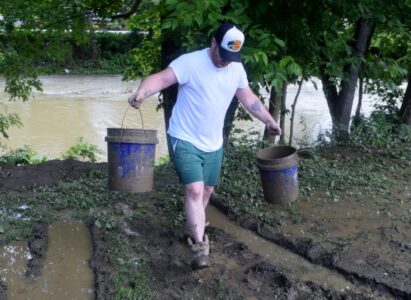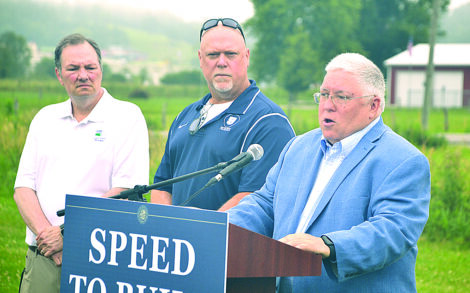West Virginia Lawmakers Weigh In on Wait for Federal Disaster Declaration

photo by: Derek Redd (file)
T.J. Porter walks back to his house on Lumber Avenue in Wheeling after dumping out two buckets of mud from his basement on June 18.
WHEELING — As local flood victims wait for movement from Washington, D.C., on federal assistance, Delegate Shawn Fluharty faults the West Virginia Legislature for not being proactive and establishing a flood resiliency fund earlier this year.
Fluharty, D-Ohio, also is requesting that Gov. Patrick Morrisey call a special session of the Legislature for the purpose of directing money from the state’s Rainy Day Fund toward help for flood victims. He noted such action would likely help with obtaining financial assistance locally from the Federal Emergency Management Agency.
The communities of Valley Grove and Triadelphia in Ohio County were struck by flash flooding on June 14, resulting in nine people losing their lives and much property damage.
West Virginia’s congressional delegation — U.S. Sens. Shelley Moore-Capito and Jim Justice and Reps. Carol Miller and Riley Moore, all R-West Virginia — has been called on to urge President Donald Trump to sign a disaster declaration that would bring financial assistance to local flood victims from FEMA.
“Everybody is waiting for the federal government to act. But if you look at other states, they already had (mechanisms for funding flood disasters) in place,” Fluharty said.
He asserted that FEMA assistance is more likely to come to states where a system is already in place to help flood victims. Such funding was available following flooding in Kentucky — where FEMA relief came in seven days — and in Texas — where a presidential FEMA declaration came in just four days.
Fluharty said he understands the frustration with the federal government, but it’s inactivity “at the state level that infuriates me.”
Justice, a former governor who is now a U.S. senator, had pushed the Republican-led legislature to establish a Flood Resiliency Fund after flooding hit Greenbrier County and surrounding areas in 2016. The money would have been used for flood prevention measures such as dredging waterways and reinforcing bridges.
Justice suggested the account be funded at $100 million, though no money was ever approved. Republicans objected to it receiving money taken from the state’s Rainy Day Fund.
This year, Democrats attempted to resurrect the idea with an amendment to the budget bill that would put $50 million from the Rainy Day Fund in the account, but Republicans again objected.
“Our Flood Resiliency Fund is funded at zero,” Fluharty said. “I’m feeling that is why FEMA isn’t jumping in right away. Other states have packages that coincide with FEMA funding. FEMA likes to know there is a game plan and what it looks like in a blueprint.”
Fluharty added it particularly angers him that members of the state’s congressional delegation, all Republicans, don’t appear to be pushing the Republican Trump to sign the disaster declaration.
“What they are doing is legislative malpractice,” he said. “They could have leveraged their votes on the ‘Big Beautiful Bill’ for the FEMA declaration. Instead, they just fell in line and didn’t put up a fight. Now people are furious. It’s sickening that we are still dealing with this.”
Delegate Bill Flanigan, R-Ohio, wants it known that he voted in favor of the amendment placing $50 million in the Flood Resiliency Fund.
“It was for flood prevention measures, but maybe if we had things like metal storage units out of the waterway (the destruction wouldn’t have been so bad). I voted for it,” he said.
Flanigan added that while “people may not like it,” the flood plain area must be rezoned.
“We can’t have containers blocking the waterway and causing more problems than it should have,” he said. “You have to do things to make sure they don’t go downstream and hurt us more.”
State Sen. Ryan Weld, R-Brooke, said a federal declaration of emergency for local communities is “largely dependent on the efforts of our governor and federal delegation.”
“Without being a part of either of those … has FEMA come back and asked for more information?” Weld asked. “I would like to know that first. Did West Virginia neglect to do something? Obviously, there was some reason why Texas was given a designation so quickly. Maybe it was tied to the sheer number of deaths occurring there?
“Are we waiting for more information? It is getting to be one month out from that horrific tragedy. The federal government needs to make a decision soon. If they need more info, they have to let us know.”
Weld added it is incumbent upon the governor’s office and the state’s members of Congress to ensure the designation and funding happen.
“They are the links between Triadelphia, Valley Grove and the federal government,” he continued. “It is imperative they do all they can to make sure FEMA comes in.”
Weld described the role of state lawmakers, meanwhile, as “more tactical.”
“We are on the ground in the days and weeks following an emergency — that is where our duties fall,” he said.
State Sen. Laura Wakim-Chapman, R-Ohio, has sent a letter to each member of the congressional delegation, asking if there is anything state lawmakers can do to get the FEMA declaration signed.
She also has posted the link on her social media to the survey flood victims must fill out to determine the amount of destruction in a community following an emergency. This information is used in determining a FEMA designation.
“The problem here is there is a lot of frustration, and reasonably so,” Wakim-Chapman said. “People have lost everything — homes and cars. And we also had nine tragic deaths.
“Nothing is going to bring them back. But we do need the FEMA money.”
Wakim-Chapman said the Legislature needs to take actions now to lessen the impact of future flooding.
“I don’t think we can prevent flooding, but we can prevent as much as we can and mitigate damages,” she said.
Wakim-Chapman wants to engage the U.S. Army Corps of Engineers about the possibility of dredging local streams.
“I know the (Environmental Protection Agency) doesn’t want this for environmental reasons,” she said. “It hasn’t been done for years, but we’ve had a lot of loss of human lives.”
Wakim-Chapman added that she has proposed bills during recent legislative sessions to establish an all-volunteer West Virginia State Guard that could be called out by the state when needed during a disaster.
“Unfortunately, this has not been put on a committee agenda,” she continued. “It would be one of the common sense measures the state can take to assure the manpower to help our communities.”
She also suggested the state look at its emergency alarm system.
“It happened so quickly,” she said of the flash flooding on June 14. “At least the human loss of lives could have been saved if there were faster warnings.”
A letter to West Virginia’s congressional delegation attributed to Delegate Charles Sheedy, R-Marshall, appeared to take strong issue with the members for not pushing the FEMA designation for Ohio County.
But on Tuesday afternoon, he denied he ever sent such a letter or posted it on social media.
“It’s not even on my letterhead. It’s an old letterhead,” he said. “I was hacked.”
Sheedy said he had been in contact with Facebook officials about the post.
“But I did talk to one of Capito’s aides,” he said. “That person told me the declaration was coming by no later than at the end of this week.”
Sheedy noted “there’s not a lot the state can do until FEMA comes in.” He doesn’t represent Ohio County, but he noted he has been out viewing the damage.
“They still have a long way to go to recovery,” he said of the affected communities. “It will take a while.”





